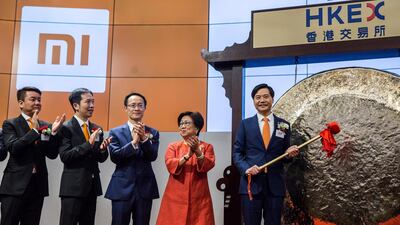US tech titans are sitting on at least $60 billion (Dh220.3bn) of untapped paper wealth, choosing to stay private for longer. Their counterparts in China are taking a different path, rushing to the public markets to cash in.
Five initial public offerings have helped at least 16 tech bigwigs ring up a combined $48bn of net worth at the time of the IPOs, according to data compiled by the Bloomberg Billionaires Index. Half of them are co-founders of Xiaomi, with shares of the smartphone maker valued at $26.5bn on its July 9 debut. Pinduoduo chief executive Colin Huang was worth $9.9bn two weeks later, when the e-commerce platform went public in the US at $19 a share.
China’s unicorns - private companies valued at more than $1bn - “are more opportunistic” when it comes to timing their IPOs, said Kevin Diao, CEO of Meixin Global, an online asset-management platform that offers unicorn investment products. “If they achieved better financial performance at the end of 2017, they’ll seek an offering this year because they’re not sure whether their growth can sustain and support the valuation.”
Xiaomi’s 2017 revenue, for example, surged 67 per cent from a year earlier after posting annual growth of just 2.4 per cent in 2016. Revenue at Meituan Dianping, another e-commerce platform that’s set to go public this week, climbed 161 per cent last year after more than tripling in 2016.
_______________
Read more:
Fortnite craze makes game designer a billionaire
Zuckerberg hit with $15.9bn loss from Facebook rout
Billionaire art lover is looking to make a historic sale
_______________
The rapid creation of wealth is taking place even as other tycoons are seeing declines in their fortunes. Twelve Chinese tech billionaires on the Bloomberg index have collectively lost $12.1bn this year as of Sept. 18, led by Netease’s William Ding, who’s down almost $8.5 billion as shares of the game developer have plunged. The MSCI AC Asia Information Technology Index dropped 11 per cent in 2018.
Silicon Valley has had fewer unicorn IPOs this year, even as valuations for firms such as Uber have soared.
Staying private can keep companies focused on the long term, and avoid wild swings in value caused by changes in the stock market. But it doesn’t guarantee a higher valuation each round. Palantir Technologies was valued at $20bn in a 2015 funding round but Morgan Stanley mutual funds have cut the valuation several times over the past two years. The funds’ June 30 valuation implies the data miner was worth just $4.4bn, meaning Palantir’s co-founders would only have a combined stake of $1.76bn.
Selling shares in an IPO doesn’t guarantee instant riches on both sides of the world. The Hong Kong Stock Exchange and the US Securities and Exchange Commission both require a minimum lock-up period of 180 days, and 36 months if listing in mainland China.
The “lucky rich” from China also have to maintain their wealth amid the threat of a potential trade war and the dangers from its shadow banking system.
Chinese authorities have recently tried to reduce financial risk with a rule change allowing wealth management products (WMPs) to invest directly in the stock market. The effort is focused on reducing the size of the nation’s shadow-banking system.
WMPs, asset management products offered by banks that promise yields higher than deposits, have been a driver in the growth of off-balance-sheet lending.
Commercial banks can now open accounts to invest their WMP assets straight into all “sanctioned” financial products, China Securities Depository and Clearing said in a statement on Wednesday. The rules are due to take effect at the end of 2020.
Meanwhile, Meituan’s IPO timing will be a test of investor confidence. Meixin’s Mr Diao said his company participated in subscribing Meituan existing shares in March through the secondary market before it filed for the IPO, and the HK$69 (Dh32) price per share is 20 per cent higher than he expected amid the recent volatile market. He said his clients are satisfied with the return but concerned the offering price is too high to follow up and subscribe, so they decided to just wait and see the market reaction.
“September is a key time for the IPO market as NIO and Meituan debut,” Mr Diao said. “If they perform well, the market won’t be too pessimistic, but if they don’t look good, investors’ enthusiasm will turn cold.”

